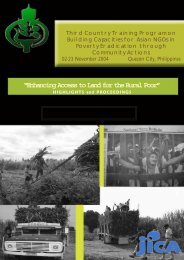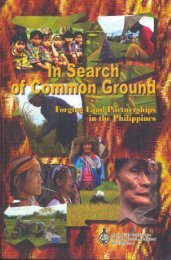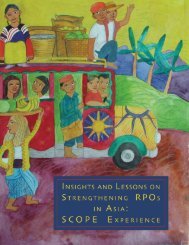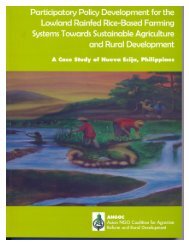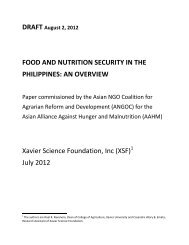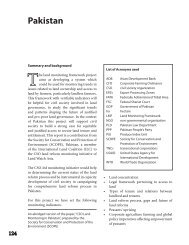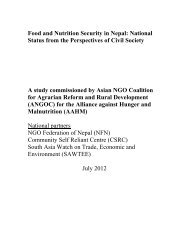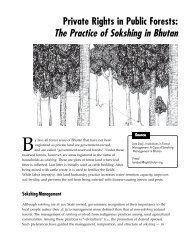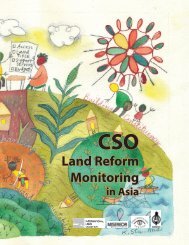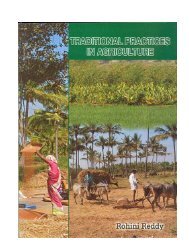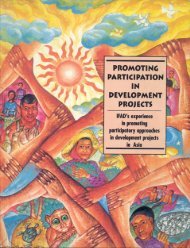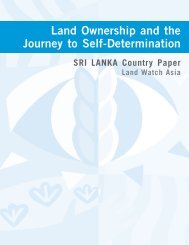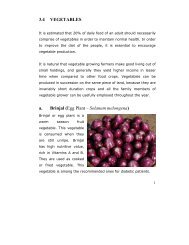Securing the Right to Land FULL - ANGOC
Securing the Right to Land FULL - ANGOC
Securing the Right to Land FULL - ANGOC
Create successful ePaper yourself
Turn your PDF publications into a flip-book with our unique Google optimized e-Paper software.
Stanvac, Total Oil Company, etc. are examples of big corporations<br />
that are able <strong>to</strong> influence <strong>the</strong> policies of <strong>the</strong> Indonesian<br />
Government in regard <strong>to</strong> land and o<strong>the</strong>r natural resources.<br />
The second fac<strong>to</strong>r is <strong>the</strong> inefficiency of production which is <strong>the</strong><br />
legacy of many years of feudalism. Where modern technology<br />
has been introduced, this has benefitted not <strong>the</strong> small peasants<br />
but big local businessmen, big landowners, and transnational<br />
agricultural corporations.<br />
Third, is state violence and <strong>the</strong> anti-democratic, anti-people,<br />
and anti-peasant policies of <strong>the</strong> Government. Successive administrations<br />
have used draconian measures intended <strong>to</strong> maintain<br />
<strong>the</strong> security of <strong>the</strong> state, particularly in <strong>the</strong> face of agrarian<br />
unrest. Peasant leaders have been arrested, jailed, and even<br />
murdered. Cases like <strong>the</strong>se have taken place in Bulukumba<br />
(South Sulawesi), Garut, Subang, Pangalengan, Bogor, Sumedang,<br />
and Ciamis (West Java), Banyumas and Wonosobo (Central<br />
Java), Manggarai (East Nusa Tenggara), Muko-Muko (Bengkulu),<br />
Labuhan Batu and Porsea (North of Sumatra), Sesepa-Luwu and<br />
Dongi-Dongi (Central Sulawesi), Lombok (West Nusa Tenggara),<br />
Halmahera (Nor<strong>the</strong>rn Mollucas), and Banyuwangi and Pasuruan<br />
(East Java).<br />
The State uses violence <strong>to</strong> put down local resistance <strong>to</strong> many<br />
state or corporate infrastructure projects funded by multilateral<br />
financial institutions, such as <strong>the</strong> ADB and <strong>the</strong> WB. These infrastructure<br />
projects generally infringe on <strong>the</strong> land rights of local<br />
communities, particularly indigenous peoples. Infrastructure<br />
projects are Yudhoyono’s second priority after <strong>the</strong> expansion of<br />
big-plantation areas for bio-fuel energy.<br />
Civil society organizations and NGOs in Indonesia are conducting<br />
<strong>the</strong>ir advocacy work in response <strong>to</strong> <strong>the</strong> abovementioned<br />
THE PERSISTENCE OF POPULAR WILL<br />
101<br />
analysis of <strong>the</strong> country’s agrarian crisis. A number of <strong>the</strong>m are<br />
demanding <strong>the</strong> cancellation of all infrastructure projects and<br />
debt problems. These groups include peasant movements such<br />
as AGRA (Alliance of Agrarian Reform Movement), STN (Serikat<br />
Tani Nasional), API (Aliansi Petani Indonesia), Petani Mandiri,<br />
and o<strong>the</strong>r social movements. Since <strong>the</strong> 1990s <strong>the</strong> networks of<br />
NGOs and a number of progressive intellectuals have played an<br />
important role in promoting land rights. These are Bina Desa, KPA<br />
(Konsorsium Pembaruan Agraria), Walhi (Wahana Lingkungan<br />
Hidup Indonesia), and YLBHI (Yayasan Lembaga Bantuan<br />
Hukum Indonesia).<br />
The Indonesian peasant movement is demanding an end <strong>to</strong><br />
state violence directed at <strong>the</strong>ir sec<strong>to</strong>r, and <strong>the</strong> release of peasant<br />
leaders that have been thrown in prison on <strong>the</strong> basis of<br />
anti-peasant laws. At <strong>the</strong> same time, <strong>the</strong> Indonesian peasant<br />
movement rejects <strong>the</strong> plan of <strong>the</strong> current government <strong>to</strong> repeal<br />
<strong>the</strong> Basic Agrarian Law of 1960 (UUPA). The draft law intended<br />
<strong>to</strong> replace <strong>the</strong> UUPA strongly favors <strong>the</strong> interests of big landowners.<br />
It <strong>to</strong>tally rescinds <strong>the</strong> spirit and intent of <strong>the</strong> UUPA <strong>to</strong><br />
carry out agrarian reform.<br />
Strategies <strong>to</strong> Advance Access<br />
<strong>to</strong> <strong>Land</strong> and Tenurial Security<br />
Maximizing Opportunities Made Available by<br />
<strong>the</strong> RPPK Policy<br />
The RPPK outlines <strong>the</strong> policy of <strong>the</strong> Yudhoyono government in<br />
discussing, evaluating, and resolving problems in <strong>the</strong> agricultural<br />
sec<strong>to</strong>r, particularly in regard <strong>to</strong> farming, plantations, fisheries,<br />
and forestry, and especially those arising since <strong>the</strong><br />
1997-1998 economic crisis.<br />
In o<strong>the</strong>r words, <strong>the</strong> policy defines <strong>the</strong> government’s strategy <strong>to</strong><br />
address challenges that affect farmers, farm workers, fishers,<br />
forest dwellers, and o<strong>the</strong>r poor communities. The RPPK is a<br />
starting point for observers attempting <strong>to</strong> understand how <strong>the</strong><br />
Yudhoyono government intends <strong>to</strong> address poverty in <strong>the</strong> country<br />
and <strong>to</strong> improve <strong>the</strong> lives of farmers. For <strong>the</strong> present, at least,<br />
<strong>the</strong> RPPK would be judged according <strong>to</strong> <strong>the</strong> actions of <strong>the</strong> government<br />
in <strong>the</strong> past two years (2005–2007).<br />
The RPPK emphasizes not just production and economic aspects,<br />
but ideological ones as well. The ideology behind <strong>the</strong><br />
RPPK policies demands that agricultural revitalization must be<br />
ASIAN NGO COALITION FOR AGRARIAN REFORM AND RURAL DEVELOPMENT



